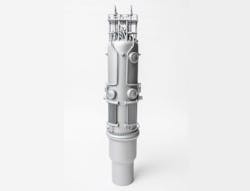Dairyland Power Cooperative signs MOU with NuScale Power on exploring Carbon-free potential of Small Nuclear
A Wisconsin power cooperative is the latest supplier taking a deep look at the potential of smaller nuclear power plants to help decarbonize its generation mix.
Dairyland Power Cooperative and Oregan-based SMR developer NuScale Power signed a memorandum of understanding on exploring the potential deployment of the latter’s next-gen nuclear technology. The SMR design, while not yet deployed anywhere, has received some key federal approval and would offer the possibility of safer, less expensive and carbon-free nuclear energy with a smaller footprint than conventional plants.
Canadian Partners aiming at Nuclear Fusion as Future Key to Decarbonization
Dairyland Power Cooperative includes 24 member systems representing about 600,000 customers in the region. Generation capacity is more than 1 GW, including a high percentage of coal-fired power, but Dairyland is trying to decarbonize its portfolio.
NuScale’s SMR VOYGR power plants include nuclear reactor modules which would be smaller than the nation’s current uranium-based power plants. The U.S. Nuclear Regulatory Commission has approved elements of the NuScale design, but market deployment is still a goal into the future.
Nuclear energy does not emit greenhouse gases and represents close to 20 percent of the current U.S. generation mix, and more than half of the nation's carbon-free power. A recent report sponsored by the Idaho National Laboratory examined SMR nuclear as a future carbon-free resource for Net-Zero Microgrids.
“Dairyland is examining carbon-free power supply technologies including NuScale’s small modular reactor nuclear plants,” said Brent Ridge, Dairyland President and CEO. “This agreement provides Dairyland an opportunity to explore this technology and evaluate whether it might be a viable long-term alternative to provide our members with safe, reliable and cost-effective electricity in a lower carbon future.”
NuScale has touted its plant design as flexible and could provide load following and grid support to balance the intermittencies of wind, solar and hydroelectric power. The smaller footprints also could place the SMRs within retired coal plant sites, according to reports.
“NuScale is thrilled to partner with an environmentally-focused, forward-thinking organization like Dairyland,” said John Hopkins, NuScale Power President and Chief Executive Officer. “Our advanced technology can deliver safe, affordable, and green energy making NuScale the ideal partner to help Dairyland execute their vision to grow, innovate, and deliver value as a premier member-driven energy cooperative.”
Earlier this year, NuScale Power announced an agreement with Poland’s copper and silver producer Polska Miedź S.A. (KGHM). Under terms of the deal, if fully realized, NuScale could deploy a VOYGR plant in Poland by 2029.
NuScale Power has been supported by numerous industry partners, including engineering and construction giant Fluor. The company also has a business combination deal with Spring Valley Acquisition Corp. that could take into the public trading market this year.
Some critics have questioned the safety and affordability of even SMR nuclear projects. The massive Vogtle units 3 and 4 project by Georgia Power has been delayed numeous times with cost overruns approaching $30 billion.
-- -- --
(Rod Walton, senior editor for EnergyTech, is a 14-year veteran of covering the energy industry both as a newspaper and trade journalist. He can reached at [email protected]).
About the Author
Rod Walton, EnergyTech Managing Editor
Managing Editor
For EnergyTech editorial inquiries, please contact Managing Editor Rod Walton at [email protected].
Rod Walton has spent 17 years covering the energy industry as a newspaper and trade journalist. He formerly was energy writer and business editor at the Tulsa World. Later, he spent six years covering the electricity power sector for Pennwell and Clarion Events. He joined Endeavor and EnergyTech in November 2021.
Walton earned his Bachelors degree in journalism from the University of Oklahoma. His career stops include the Moore American, Bartlesville Examiner-Enterprise, Wagoner Tribune and Tulsa World.
EnergyTech is focused on the mission critical and large-scale energy users and their sustainability and resiliency goals. These include the commercial and industrial sectors, as well as the military, universities, data centers and microgrids. The C&I sectors together account for close to 30 percent of greenhouse gas emissions in the U.S.
He was named Managing Editor for Microgrid Knowledge and EnergyTech starting July 1, 2023
Many large-scale energy users such as Fortune 500 companies, and mission-critical users such as military bases, universities, healthcare facilities, public safety and data centers, shifting their energy priorities to reach net-zero carbon goals within the coming decades. These include plans for renewable energy power purchase agreements, but also on-site resiliency projects such as microgrids, combined heat and power, rooftop solar, energy storage, digitalization and building efficiency upgrades.

